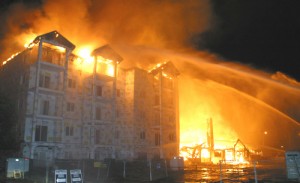In Axis Surplus Ins. Co. v. Caribbean Beach Club Assn., 2014 WL 2900930 (Fla.Dist.Ct.App., June 27, 2014), a Florida court recently held that the insurer could not rely on a policy requirement that conditioned recovery of the cost of complying with current building codes during reconstruction on having completed the work within two years of the loss. The insurer waived the two-year requirement by failing to raise it until the entire two years had elapsed and choosing to spend that time cooperating with the policyholder’s efforts to determine the necessary scope of repair instead.
 The insured, Caribbean Beach Club Association, owned a time-share condominium building in Fort Myers that was heavily damaged by fire in April 2003. It had property insurance coverage with Axis Surplus Insurance Company, and it had paid an additional premium for an Ordinance or Law Coverage Endorsement that provided up to $2.5 million for any increased cost of reconstruction incurred as a result of the enforcement of local ordinances or laws. The endorsement recited that the insured could not recover, however, until after the property was actually repaired or replaced and that reconstruction had to take place within two years’ time.
The insured, Caribbean Beach Club Association, owned a time-share condominium building in Fort Myers that was heavily damaged by fire in April 2003. It had property insurance coverage with Axis Surplus Insurance Company, and it had paid an additional premium for an Ordinance or Law Coverage Endorsement that provided up to $2.5 million for any increased cost of reconstruction incurred as a result of the enforcement of local ordinances or laws. The endorsement recited that the insured could not recover, however, until after the property was actually repaired or replaced and that reconstruction had to take place within two years’ time.
The county building authorities had a “50% rule” mandating that if a building was more than 50% damaged, any reconstruction or repair had to comply with all current building codes. In this case, the parties stipulated that that would add $1.8 million to the repair bill because it would require that the entire building be demolished and rebuilt at a higher elevation from the ground.
As a result, Caribbean and Axis cooperated with the common goal of convincing the county authorities not to enforce the 50% rule. In November of 2004, however, some 19 months after the blaze, the county informed the policyholder that demolition would indeed be required. As of that point in time, Axis estimated that the replacement would take until the end of 2005, but it continued to cooperate with Caribbean, hiring a contractor who estimated the full replacement cost to be $2.8 million. According to the court, “[a]s late as early June 2005, Axis remained prepared to pay the full replacement cost and continued to adjust the claim.”
Then, for some reason, the insurer did an about face; it tendered the actual cash value to Caribbean but announced that it had decided to deny the increased cost of reconstruction claim because more than two years had elapsed. The policyholder sued, and the Circuit Court awarded it summary judgment. On appeal, a unanimous panel of the state’s intermediate level appellate court affirmed. Judge Edward C. LaRose’s opinion noted:
- that Axis waited over two years to raise the two-year requirement, save in “a general, non-specific, reservation of rights letter;” and
- that the delay in rebuilding was occasioned by a one-and-one-half year effort by both the policyholder and the carrier to convince the authorities to allow an “as was” reconstruction.
The court then held that the endorsement’s two-year provision was a forfeiture clause that could be waived and that Axis had done just that.
Axis’s failure to bring the provision to Caribbean’s attention despite knowing that Caribbean expected the entire claim to be paid and Axis’s continued adjustment of the entire claim after the two-year period expired were unequivocal acts wholly inconsistent with invoking the forfeiture. Axis waived the two-year limitation.
* * *
When an insurer acquiesces to an insured’s failure to strictly adhere to a timetable of payment or performance, the courts are inhospitable to the insurer’s sudden invocation of strict enforcement of forfeiture provisions.

